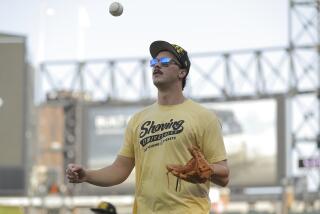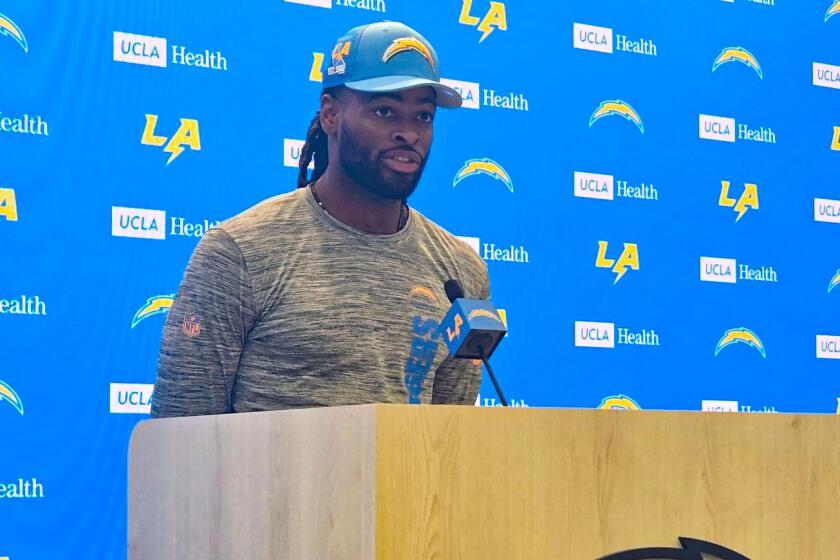Hawaii’s Walk Figures to Remain a Prisoner in Paradise
- Share via
ALBUQUERQUE, N.M. — A man sitting behind the Hawaii Islanders’ dugout, studying the action on the Sports Stadium field only slightly less intently than his next beer, leans across the aisle.
“With all the trouble Pittsburgh’s having,” he says to a man keeping score of a game between the Islanders and the Albuquerque Dukes, “couldn’t they use a pitcher like Bob Walk?”
Several others in the Pacific Coast League have been asking the same question this summer.
While Walk chalks up impressive numbers for the Islanders, the Pirates’ top farm club, Pittsburgh remains mired in last place in the National League East, 29 games behind the St. Louis Cardinals.
With a 15-5 record and 2.65 earned-run average, Walk leads the PCL in wins, ERA, innings pitched (156) and complete games (11). He has struck out twice as many as he has walked (114 to 56), a ratio that usually brings a ticket to the major leagues.
But Walk, 28, is “frozen” in the minors by a rule that was made to protect the players. In the case of the bushy-haired right-hander from Hart High and College of the Canyons, the rule has only delayed a natural progression.
“He’s in a bind, but it’s not a bind of our choosing,” said Pirates General Manager Joe Brown. “It’s a bind of the rules.
“In my mind, he’s a major league pitcher. But the question is, ‘How do we get him there?’ ”
In trying to promote Walk, Brown believes, the Pirates almost surely would lose him.
As a minor leaguer whose major league options have been exhausted, Walk would have to clear irrevocable waivers through the major leagues before the Pirates could bring him up.
Any team that claimed him would be able to pick him up by paying Pittsburgh the waiver price of $20,000, a rather paltry sum for a pitcher with World Series experience. Having resurrected a career that seemed over when the Atlanta Braves gave him his outright release 16 months ago, Walk is the winningest pitcher in Triple-A.
Unless the Pirates can work out a trade, however, Walk is trapped in the minors. He will become a free agent if he’s not brought up before the end of the season.
Walk said it really isn’t all that bad--he lives with his wife, Lorrie, and two sons in a condominium on Waikiki Beach--but if he doesn’t reach the majors this season it could cost him more than $100,000.
His minor league contract calls for him to be paid $105,000 in Hawaii. His major league contract, should he be promoted, could be worth as much as $220,000, including incentive bonuses.
Still, Walk isn’t complaining.
“There’s nothing I can do,” he said. “The main thing I’m thinking about now is just finishing the year out and trying to stay healthy and have a good year and start over next spring. . . .
“It’s not that frustrating because I’m having a lot of fun here and I enjoy being here. And I am getting paid pretty well for the spot I’m in. . . .
“If I start thinking about the big leagues and getting frustrated, it’s going to affect my pitching down here, and all that’s going to do is make it tougher for me to pitch in the big leagues next year. I’m just going to forget about it right now. . . .
“Of course, I would like to be there, and every time I turn on the TV and see the (major league) scores, I wish I was there. But I can’t dwell on it and get upset.”
Brown believes Walk will be in the majors before the end of the season.
“But don’t ask me to guess where,” he said this week at the Sports Stadium, where he watched Walk beat the Dukes, 3-1, on a five-hitter. “I’m hopeful that it will be in Pittsburgh.”
Walk got himself into this predicament. His problems began when he was traded from the Philadelphia Phillies to the Braves for outfielder Gary Matthews on March 25, 1981.
Walk had been a regular member of the Phillies’ starting rotation the previous season. Only 23 at the time, he started and beat the Kansas City Royals in the opening game of the ’80 World Series, sending the Phillies on their way to the world championship.
The following spring, the Phillies sent him packing. Matthews was eligible to become a free agent at the end of the season, and the Braves didn’t want to be caught empty-handed. The Phillies obliged them, offering Walk.
Walk didn’t take it very well. He didn’t want to go to Atlanta. He felt sorry for himself. He sulked. And he put a lot of pressure on himself. Matthews, a former National League Rookie of the Year who averaged 23 home runs and 83 runs batted in in his final two seasons in Atlanta, was a popular player for the Braves. Walk felt he had to do well to justify the trade.
But as the Braves’ No. 5 starter, he got only infrequent work in the first few weeks of the season as the Braves used a four-man rotation because of the many off-days and rainouts. He never did get into a groove, he said.
After the players’ strike, the Braves called up several pitchers from their Triple-A team in Richmond, Va., and sent several down, including Walk. His record with the Braves that season was 1-4 in 12 appearances. The previous year, he was 11-7.
Said Walk: “Back then I was a little more selfish and I kind of took the attitude of, ‘Why me? Why is this happening to me? Why’d I go from a world championship team to a last-place team, and now I don’t even pitch regularly?’
“I didn’t handle it right. I wasn’t mature enough to be in that situation.”
The following spring, Walk seemed to have straightened himself out. He started the second game of the season and was a regular starter through most of the summer. He fell into a slump, however, and Manager Joe Torre moved him to the bullpen.
Pitching in relief one day, he broke the big toe on his right foot when he got tangled with an umpire while backing up third base on a ball hit to the outfield.
Pascual Perez, acquired in a trade with Pittsburgh earlier in the season, replaced him in the starting rotation.
The replacement turned out to be permanent.
“I got kind of buried,” said Walk, who wound up with an 11-9 record, but won only once in the final two months of the season.
In the playoffs, he pitched one inning as the Braves were swept in three games by the Cardinals.
In the spring of 1983, the Braves sent him back to Richmond before the start of the season.
He didn’t take that too well, either.
“I completely balked at going,” Walk said. “The year before, I had only started two-thirds of the year and still was able to have the second-most wins on the team (11), and all of a sudden I’m supposed to be a Triple-A pitcher?
“I went to Triple-A with a pretty (bleep) attitude. At first, I said I wasn’t going. I ended up going down there, but I didn’t do nothing. I sat around, didn’t run. I was trying to cause waves so I’d get traded.
“I got off to like an 0-7 start with an ERA of about 30 or something. It was amazing. I had more walks than innings pitched and about twice as many hits as innings pitched. It was unbelievable. I was getting killed every time out there.
“So about halfway through the season, after about a thousand meetings with Johnny Sain, who was the pitching coach down there, I finally got it through my head that if I wanted to get back to the major leagues, I was going to have to start working again.”
Despite Walk’s miserable start, the Braves called him up on June 29. But he didn’t pitch until two weeks later.
“I never even got a scare,” he said. “You know how they call (the bullpen) to have people warm up? They call that a scare. Not even one time in two weeks did I ever even warm up to get in a game, much less get in a game.”
Finally, he started the second game of a doubleheader against the Phillies on July 12. He gave up three runs and seven hits in 3 innings. Two days later, he was back in Richmond.
“I had already figured that they’d given up on me,” he said.
The following spring, they made it official.
“When it actually happened,” Walk said of his release by the Braves, “it was like somebody had lifted a weight off of me. All through ‘83, all I worried about was getting released. Once it happened, I saw, it’s not that big a deal.
“Life goes on.”
Although he said at times he “felt like I was pitching with a gun to my head,” Walk said he bears no animosity toward Torre or anybody else in the Atlanta organization, as he once did.
“I just didn’t do the job there,” he said. “When things started going bad, I just caved in. I’m not bitter, as I was then. If I’d had the attitude then that I do now, I think I’d probably still be in Atlanta and doing well.”
Released by the Braves, Walk contacted several teams. Only Pittsburgh offered a contract.
The Pirates sent him to Hawaii, but told him he’d get a chance to pitch in the majors before the end of the season.
True to their word, the Pirates called him up midway through the season. On July 16, he pitched 8 innings and struck out eight to beat the Dodgers, 4-1, on a five-hitter.
“But in the ninth inning of that game something in my elbow popped,” Walk said.
He started again five days later against San Diego, but after giving up four runs in two innings he asked Manager Chuck Tanner to pinch-hit for him. He had strained a ligament in his right elbow and the pain was killing him. He spent the rest of the season on the disabled list.
This spring, the Pirates brought him along slowly, giving him only 6 innings of work in Florida.
He said he still felt a little sensation in his elbow.
“He was a little bit behind because of the injury,” Tanner said last week at Dodger Stadium. “And we weren’t going to hurry him or hurt him.”
Walk wasn’t obligated to go to Hawaii. Out of options and a veteran of more than three years of major league service, he had to give his permission to accept the assignment to the minors. He could have declared himself a free agent.
But he liked playing for Hawaii, he said, and the Pirates had been good to him. Besides, they offered a pretty good contract.
He has justified their faith in him. In fact, he may have done too well for his own good.
By winning 11 of his first 12 decisions, he made other teams stand up and take notice.
Walk said he didn’t realize at first that he was frozen.
“I always thought you could get around waivers,” he said. “Guys like Don Sutton have gone through waivers. So I thought, ‘How could I not get through waivers?’ I didn’t think they’d have any trouble bringing me back up.”
But bringing a player through waivers is always a gamble.
“Obviously, the outstanding player is going to draw everybody’s attention,” said Branch Rickey Jr., director of minor league operations for the Pirates. “But it doesn’t matter how ordinary some other players are if they fit the needs of another club.
“They can be a specialty-type player and not be very impressive--24 of the other 25 clubs might not be interested. But it only takes one.”
Walk, of course, has been extraordinary.
“Anybody that I’ve talked to, not only in our organization but in other organizations in the league, say he’s the best pitcher in the league,” Brown said.
Said Albuquerque Manager Terry Collins, whose team has been beaten three times by Walk this season: “Our biggest question is, ‘Why is he here?’ We see this guy go through our lineup, which we consider a pretty good offensive ballclub, and we certainly think he’s got to be able to pitch in the big leagues. . . .
“You see guys with that kind of stuff and with major league experience, you’ve got to say, ‘Jeepers, he’s got to get a chance to pitch for somebody up there.’ You look around the major leagues--somebody could be using him. He could be starting for a lot of clubs.”
Walk said he is a different pitcher than he was in Atlanta. He doesn’t throw as hard--his fastball used to be clocked consistently in the low 90s--but he’s more refined.
“As I’ve gotten older,” he said, “my control has gotten a lot better and I don’t have to worry about just throwing strikes. I throw the ball to spots. I work the ball in and out on hitters.”
Chuck Hartenstein, the Islanders’ pitching coach, said Walk has improved considerably.
“He’s learned how to set up hitters a little bit better and determine what pitches certain hitters hit all the time,” he said. “In other words, he learned how to throw pitches that hitters couldn’t hit, rather than pitching just a power game, which he had been used to in the past.”
Hartenstein said Walk has been ready for the majors for about two months now.
The problem, of course, is how to bring him up.
“We don’t want to take the chance,” Brown said. “We’ve talked to a number of clubs about a possible trade. Several have expressed interest, but none of them have really indicated sufficient interest to make it worth our while. . . .
“Our preference would be to move him to Pittsburgh because we believe he can pitch in the major leagues. But if we can’t, rather than lose him for a rather small sum of money, considering his ability, we’d rather get a player of equal talent in return.”
So Walk, the class of the PCL, sits and waits.
But he doesn’t sulk.
“It’s not something I have any control over, so I’ve gotten to where I don’t worry about it,” he said. “All I can do is go out and pitch. That’s all I have control over, so that’s what I do. It used to be that I’d worry about all those things I had no control over, and not worry about my pitching.”
He picks up a reporter’s notes, which chronicle his career.
“You can look at this piece of paper and tell that,” he said. “I worry about what goes on on the field now.”
For the time being, so do his Triple-A opponents.
‘I went to Triple-A with a pretty (bleep) attitude. . . . I sat around, didn’t run. I was trying to cause waves so I’d get traded.’
Bob Walk
Hawaii Islanders pitcher
More to Read
Go beyond the scoreboard
Get the latest on L.A.'s teams in the daily Sports Report newsletter.
You may occasionally receive promotional content from the Los Angeles Times.










